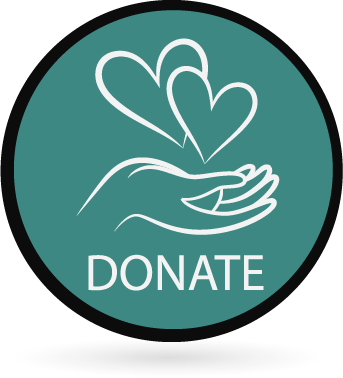Empowerment of Women
Women’s Interfaith & Empowerment Courses

Many Jewish and Arab Israeli women who live in Ramle and the environs do not know one another and have no opportunity for dialogue. This project was a joint initiative of the Open House in Ramle, the Birkat Shalom Community on Kibbutz Gezer, and the Pluralistic Spiritual Center of Neve Shalom/Wahat al Salaam.
The project created a safe, neutral space for dialogue between Jewish and Arab women using religion and culture as the subject material and springboard for deeper conversation. The dialogue had two main subjects – use of core religious stories and narratives for each religion as an introduction to interfaith conversation; and use of religious narrative to discuss the Israeli-Palestinian conflict.
Twelve women (two Christians, three Moslems and seven Jews) met 15 times during the year. Meetings were held at Neve Shalom, Open House and Kibbutz Gezer. The meetings were facilitated by two women – Vivian Rabia (from Open House) and Shai Schwartz from Neve Shalom. Rabbi Miri Gold from the Birkat Shalom community was the advisor in the teaching of Jewish texts and was a major supporter of the project. The introduction to each religion was presented by explaining a bit about the religion and then the central narratives found in the religion’s primary texts. Dr. Maram Hazazi met the group at Neve Shalom and spoke about Islam and the Koran. She selected stories about the life of Miriam (Mary, Maria), mother of Yeshua (Jesus). In this way she emphasized the commonality between Islam and Christianity. At the Open House, Juliet Gubran discussed Christianity and the New Testament and focused on central female characters in the New Testament. In the synagogue on Kibbutz Gezer Miri Gold introduced the general principles of Judaism and its main texts. She chose the narrative of Miriam, sister of Moshe. Dafna Feldman briefly described progressive Judaism in Israel and provided an overview of the different groups central to Judaism. Dalia Landau met the group at the Open House, shared the story of the house with them and how it became a pillar of Jewish – Arab and interfaith dialogue.
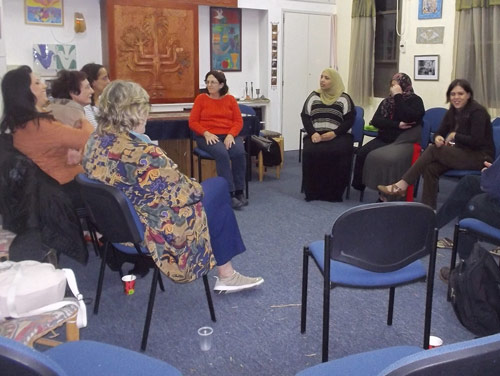
Throughout the meetings, the facilitators carefully used textual narratives to discuss issues that all the women struggle with. Beginning with the creation story and Adam and Eve to talk about gender roles, the discussions over the year included the beginning of national conflict and the role of women and men in the story of Sarah and Hagar; the common thread of Mary and Jesus in the Koran and New Testament (a surprise for the Jewish women); Jacob and Esau – sibling rivalry and family relations, and women in religious texts. Near the Passover holiday the Exodus was taught and near Easter a Christian participant described Jesus’ life until the crucifixion. For several Jewish women, hearing this story told by a Christian woman was quite emotional. Throughout the dialogue, discussion of the Israeli-Palestinian conflict was present as an outgrowth of the text study and the women’s sharing of their personal stories. It was often hard for the participants to listen to one another and it took time to develop the trust to speak openly and honestly. In their final evaluations all the women said that they would wholeheartedly recommend such a program to other women and appreciated the safe space, empathy, patience and listening that occurred. They plan to continue meeting, on their own, in one another’s homes in 2013/14 and would like to be involved in community projects.
Some of the participants have become initiators of new programs at Open House.
Women and Business
by Dalia Landau
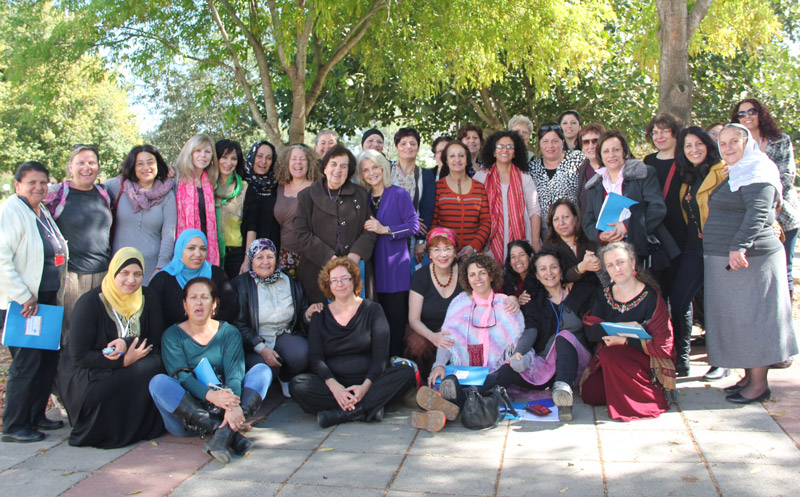 Jewish and Arab women at Nes Ammim
Jewish and Arab women at Nes AmmimIn the past 3 years Open House has been doing major work empowering women as individuals and in the community. In the Spring, between Thursday, 28th Feb. to Saturday, 2nd of March, we had a vibrant weekend at Nes Ammim in the western Galilee with about forty women. The participants, Jewish and Arab , some from the West Bank, came from Open House and from Beyond Words, an organization based in the Galilee. The workshop was led by AWE, an international American organization–Accelerating Women Entrepreneurs. The contact between our organizations was created when the project directors of AWE contacted me and came to visit me in Jerusalem.From the AWE site:
“AWE is a multi-sector effort that brings together a coalition of global
partners to exponentially accelerate the number, scale, and positive impact
of women entrepreneurs around the world.”
I was invited as a keynote speaker to open the workshop on Thursday night and led the Shabbat service on Friday followed by a dance party. (Nothing like dancing to bring people close). Ruth Dayan, the widow of Moshe Dayan, 94 and still driving, was invited as a keynote speaker on Saturday, and she and I had a “private” session together which was recorded by AWE.
The workshop had ample information about psychological, social and cultural factors relating to the status of women and their rapidly changing role in society. It also gave practical tools for creating income through doing the work we love. A significant part of the program was sharing information about our local reality here in Israel/Palestine and our struggles as women.
AWE has organized a follow up through the internet.
Women’s Interfaith Program (2011)
Open House, in co-operation with the Kolech forum of religious Jewish women and the Interfaith Encounter Association, Shatil and the Cramer Foundation created an educational program for women of faith from the three Abrahamic religions to empower them as leaders in their respective communities. Nine Jewish and nine Arab participants, both Christian and Muslim, gathered every Friday morning in May and June, 2011, for three hours in the Bi-Lingual School in Jerusalem. This course was designed to raise consciousness about issues of gender and equality, to provide tools for community leadership, to discuss the tension between our traditions and feminism, to examine current sociological research on these issues, to adapt women’s initiatives to rapidly changing needs within their communities, and to bridge traditional values and women’s visions of the future.
Many of the sessions had the character of an experiential workshop and elicited deep personal sharing. For example, one Friday morning the women read the story in Genesis about the creation of Adam and Eve, which appears in all three traditions; after sharing their thoughts and feelings about the image of Eve and the relationship between Adam and Eve, Hanna Cramer, an artist, asked the participants to sculpt the image of Woman as they experience it from the Genesis text. This artistic creativity and the ensuing discussion deepened group cohesiveness and bonding.
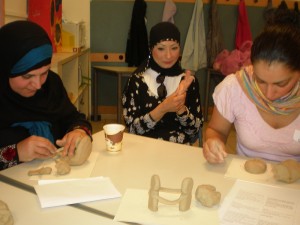 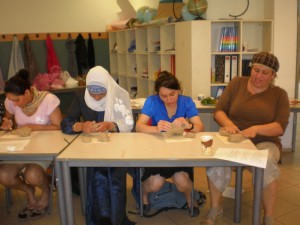 |
| Women sculpting the creation of Adam & Eve after reading the story in Genesis. |
One of the workshops led by Vivian Rabia—Open House project director—focused on people who influenced the participants’ lives and how their life journeys were transformed. This subject evoked serious reflection and opened the hearts of the women towards each other even more.
Dr. Hanna Kehat gave a presentation on “leadership in trial, leadership in adaptation”; Samar from Shatil gave the participants the tools to create projects in their own communities; Fatan Elzinati led a workshop on “mediating leadership”; and Taube Jamitovsky led a session on the journey “between personal and communal empowerment.”
The participants from Lod invited all the women for a day trip, during which they had the opportunity to see and hear the issues confronting this mixed city, from the inside rather than through the eyes of the media. This trip was particularly important for the Jewish women. According to tradition, Lod is the town of St. George, where he struggled with the dragon. Therefore, there was a visit to the historic Greek Orthodox Church of St. George in Lod, which is still central to the life of local Arab Greek Orthodox Christians today. Then they visited a mosque, where they learned about Islam and the rhythm of daily prayer. They saw an archaeological site in Lod that involves school children in the digs, and finally they visited a communal garden where the neighbors work together to enhance the life, beauty, and ecology of the neighborhood. For many of the women, it was their first time in Lod. Some of them had never entered a mosque or a church in Israel before (only as tourists abroad).
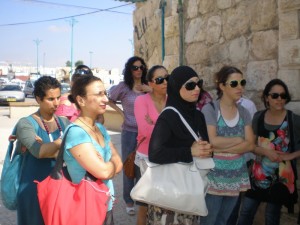 |
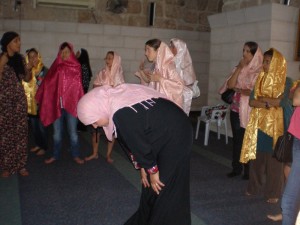 |
| The visit to the archeological site in Lod. | The visit to the Great Mosque in Lod. |
Another tour was to the old neighborhood of Katamon in Jerusalem. The tour began at Yakar, a synagogue and an egalitarian center for Jewish studies involving both women and men. For most of the Arab women, it was their first time in a synagogue, let alone a Jewish educational center. One of the Arab women said that, as a result of this visit, her “barriers of fear regarding the religion of the Other disappeared.”
Michelle Shelemay, who lives in the Katamon neighborhood, invited the whole group to her home for a visit.
That afternoon the tour ended at the Museum of Islamic Art, in which there are extraordinary exhibits from all over the Muslim world, many of them with religious significance. The Muslim women said that, since Islam is seen by many people these days as a “primitive and violent” religion, they felt particularly empowered by sharing with their friends the beauty and genius of their culture.
At the end of the course, the women’s bonds of sisterhood were so deep that they decided to continue their meetings at their own initiative. They decided to travel as a group to learn about the life of the different communities in the country and to learn more about the different cultural and historical narratives. After the summer, they met once in the Ein Kerem neighborhood of Jerusalem, where they enjoyed the beauty of the place and learned about its history. On another occasion they visited Ramle, where they spent time at Open House, saw the Old City, and met with renowned local artist Nihad Dabit. (Nihad is helping Open House children and young adults produce public art)
Lamis Salman, a group member and a nursery school teacher at Open House, has invited the whole group to her home for a Chanukah/Christmas celebration in December.
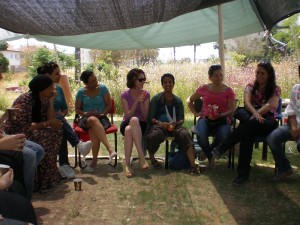 |
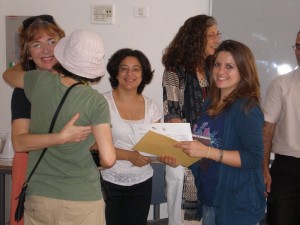 |
| The visit to the community garden in Lod. | The participants receiving certificates for their participation. |

 Summer Camp 2024
Summer Camp 2024 Summer Camp 2023
Summer Camp 2023 Summer Camp 2022
Summer Camp 2022 Summer Camp 2021
Summer Camp 2021